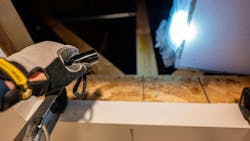Ceiling spaces tend to be not far from grade level, and thus seem safer than they actually are. This factor contributes to many of the injuries that occur among those who work in such spaces. Follow these tips to work safely in ceiling spaces:
- Scope it out. Identify what’s up there, what system voltages are involved, and where junction boxes are. This is especially important if you are pulling wire (or cable) or running raceway.
- Inspect it. Look for NEC violations. A somewhat common violation is the use of SO cord in these spaces. If you see that, consider it the proverbial tip of the iceberg.
- Assess the workmanship of existing installations. If you see wires or cables strewn haphazardly instead of being neatly routed and secured, a logic similar to seeing Code violations applies.
- Assess the cleanliness or lack thereof. If it’s especially dusty in that space, you may need to wear a dust mask and perhaps a painter’s suit (disposable paper suit).
- Make a list of the four preceding items, assessing each one for safety implications. Go over this with your supervisor before proceeding.
- Plan where you will mount any junction boxes and how you will route any conductors.
- Communicate with the tenants, other trades, and anyone else with whom you might interfere or vice versa. Let them know what you are de-energizing, what your lockout tags look like, and how long you expect to take.
- Perform lockout/tagout, no matter how “unnecessary” it may seem due to limited access or some other reason.
- Obtain the correct ladder(s) or scaffolding for access to the space. If you must stand on the top or second rung to get enough height, you do not have the correct ladder; get a taller one.
- If practical, rope off the area with yellow or red barrier tape. One advantage of doing this is you prevent people from stopping by and asking you questions. You don’t need distractions. You also protect them from injury if you drop something because they aren’t there to get hit by it.
- Carry spares up with you. It’s easy to drop a screw, washer, or other little part. Avoid unnecessary trips up and down the ladder by having extras with you.
- Work neatly and methodically. Avoid tangles of cords. Consider taping long runs of cables together prior to stepping on the ladder, so they don’t get tangled by dint of hauling them up into the ceiling space. Don’t drag them up as you go; have a helper feed them up to you. Fasten cables as you go if that’s practical.
About the Author

Mark Lamendola
Mark is an expert in maintenance management, having racked up an impressive track record during his time working in the field. He also has extensive knowledge of, and practical expertise with, the National Electrical Code (NEC). Through his consulting business, he provides articles and training materials on electrical topics, specializing in making difficult subjects easy to understand and focusing on the practical aspects of electrical work.
Prior to starting his own business, Mark served as the Technical Editor on EC&M for six years, worked three years in nuclear maintenance, six years as a contract project engineer/project manager, three years as a systems engineer, and three years in plant maintenance management.
Mark earned an AAS degree from Rock Valley College, a BSEET from Columbia Pacific University, and an MBA from Lake Erie College. He’s also completed several related certifications over the years and even was formerly licensed as a Master Electrician. He is a Senior Member of the IEEE and past Chairman of the Kansas City Chapters of both the IEEE and the IEEE Computer Society. Mark also served as the program director for, a board member of, and webmaster of, the Midwest Chapter of the 7x24 Exchange. He has also held memberships with the following organizations: NETA, NFPA, International Association of Webmasters, and Institute of Certified Professional Managers.
